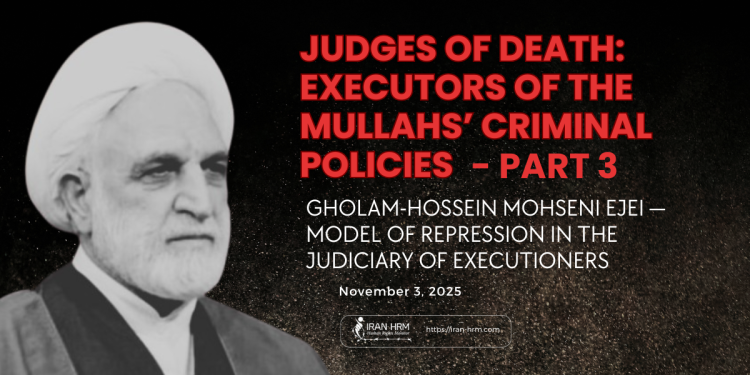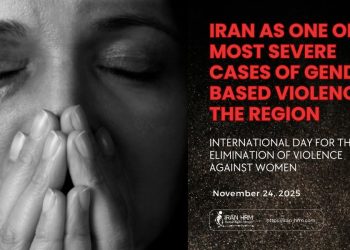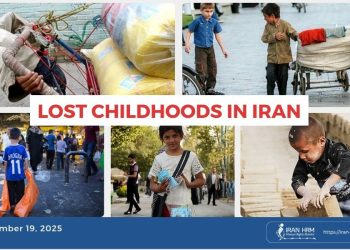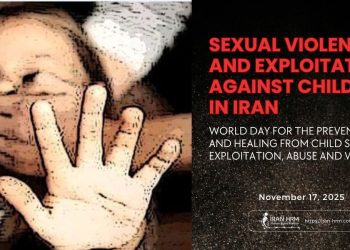The judiciary under the rule of Velayat-e Faqih is not an institution of justice but an instrument of repression and control in the hands of the Supreme Leader. In this system, “justice” is stripped of its meaning; the judiciary serves as an executive arm for security and political suppression.
Since the early years of the clerical regime, the judiciary has lacked independence and has served the consolidation of political power. Article 157 of the Constitution empowers the Supreme Leader to appoint the head of the judiciary, turning it into a pillar of political authority rather than a guardian of justice. Judges are tasked not with impartial adjudication but with enforcing the regime’s security agenda. Fundamental constitutional rights — including access to a chosen lawyer (Article 35), prohibition of arbitrary arrest (Article 32), and presumption of innocence (Article 37) — are routinely violated in revolutionary courts.
A Culture of Impunity — From the 1980s to Today
Gholam-Hossein Mohseni Ejei is one of the most prominent figures in this security-judicial nexus. Over four decades, from the Ministry of Intelligence to the top of the judiciary, he has played a decisive role in orchestrating executions, torture, and political suppression. Though not directly a member of the 1988 “Death Commission,” Ejei perpetuated the same logic of extermination under the pretexts of “enmity against God” and “corruption on earth.” Judiciary-controlled media such as Mizan News have continued to glorify the mass killings of the 1980s as “revolutionary decisiveness,” illustrating institutionalized justification of crimes.
Background and Key Positions
Born in Isfahan in 1956, Ejei has been deeply embedded in both security and judicial institutions since the 1980s. Between 1998 and 2005, he served as Prosecutor of the Special Clerical Court, a body used to silence dissent within the clergy. He was later appointed Minister of Intelligence (2005–2009) under Mahmoud Ahmadinejad, a period marked by mass arrests, torture, and forced confessions. After his dismissal, he returned to the judiciary as Attorney General and First Deputy. In July 2021, Khamenei directly appointed him as head of the judiciary.
In the decree of appointment, Khamenei wrote:
“Your Excellency, who in addition to legal competence possess valuable experience and a brilliant record in judicial affairs, are hereby appointed to the presidency of the judiciary.”
This statement reflects not merely personal praise but explicit political endorsement. In subsequent official meetings, Khamenei expressed “satisfaction” with Ejei’s leadership and called the judiciary’s performance “commendable and hopeful.”
Ejei himself, responding to international criticism over the surge of executions, openly defended the practice, calling it “a sign of the system’s determination to confront corruption and enmity.” He insisted that “death sentences are carried out according to law and Sharia,” thus legitimizing the political use of capital punishment. These remarks expose that the justification of executions is not incidental but embedded in the regime’s official discourse from the top down.
Violation of the Right to Life and Political Use of Executions
Under Ejei’s command, the right to life has been systematically violated. Between 2014 and 2021, over 1,100 prisoners — many convicted of drug-related charges based on coerced confessions — were executed. During the nationwide protests of November 2019 and the uprising of 2022, dozens of demonstrators were sentenced to death after sham trials lasting only minutes, without access to independent counsel. Amnesty International and the European Union have condemned these executions as instruments of political repression.
Ejei and the Regime’s Anti-Women Policy
Since Ejei assumed office in 2021, Iran has witnessed a surge in executions of women and worsening conditions in women’s prisons. At least 46 women were executed in 2025 — the highest annual number in more than 15 years. Only about 12% of these cases were publicly announced, reflecting the judiciary’s deliberate opacity.
The Qarchak Prison in Varamin, notorious for inhumane conditions, exemplifies the regime’s gender-based persecution. Women prisoners described it as a “dungeon of discrimination” in a letter to Ejei, citing deprivation of medical care and unsanitary facilities. The death of Somayeh Rashidi, a political prisoner denied urgent treatment, epitomizes the cruelty of this system.
Ejei’s staged visit to Qarchak in June 2022 did nothing to improve conditions. At that time, several political prisoners in quarantine were denied family visits and punished for protesting repeated power cuts. These examples reveal that misogynistic policies are not isolated acts but part of a broader strategy to break women’s resistance and intimidate society at large.
Evin Prison Fire — Concealment and Denial
Following the October 15, 2022 fire in Evin Prison, the judiciary under Ejei attempted to manipulate the narrative, claiming it resulted from “a clash among financial inmates.” Ejei accused “enemy agents” of orchestrating the incident, ordering their arrest. Eyewitnesses, however, reported explosions and tear gas fired at political prisoners who had chanted anti-regime slogans. The judiciary’s response exemplified its systemic pattern of denial and distortion.
Denial of Fair Trial and Collapse of the Rule of Law
Under Ejei, fair trial standards have been systematically undermined. Political detainees are denied independent lawyers and forced to rely on state-approved attorneys. Death sentences are routinely based on coerced confessions. Article 570 of the Islamic Penal Code — criminalizing deprivation of legal rights — has never been applied to judicial officials. The judiciary has become an instrument of political control rather than a guarantor of justice.
Suppression of Civil Society and Minorities
Ejei’s record includes violent repression of journalists and activists. In 2004, as a judiciary representative on the Press Supervisory Board, he physically assaulted journalist Isa Saharkhiz — a symbol of state violence against the press. His tenure saw the prosecution of environmental activists in 2018 under “corruption on earth” charges and intensified persecution of the Bahá’í community, amounting to systematic religious persecution under international law.
International Sanctions and Responses
The European Union sanctioned Ejei in 2011 for his role in torture and unfair trials; the United Kingdom imposed similar sanctions in 2022 over death sentences against protesters. Amnesty International has described his judiciary as deepening Iran’s “execution crisis,” using the death penalty as a political weapon. These measures reflect international recognition of command responsibility extending from Ejei up to the Supreme Leader.
Legal Analysis and Conclusion
Gholam-Hossein Mohseni Ejei personifies the fusion of intelligence and judiciary power in the ruling regime in Iran. His conduct exemplifies “command responsibility” for widespread and systematic human rights violations, including torture, arbitrary detention, and extrajudicial executions. Khamenei’s open support reinforces the chain of command in these crimes. The consistent targeting of protesters, women, and minorities amounts to crimes against humanity — specifically persecution and murder under international law.
Call to Action
The international community must activate all accountability mechanisms, including universal jurisdiction, to prosecute Ejei and other responsible officials. The UN Fact-Finding Mission on Iran should be renewed and strengthened. Targeted sanctions against revolutionary court judges and institutions enforcing death sentences must be expanded. Ensuring detainees’ access to independent lawyers and fair, public, two-stage trials must become a precondition for any engagement with the judiciary of the ruling regime in Iran.







